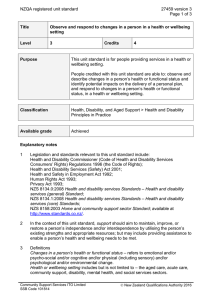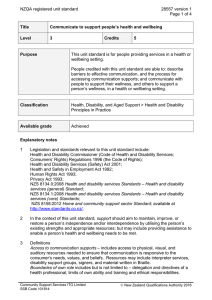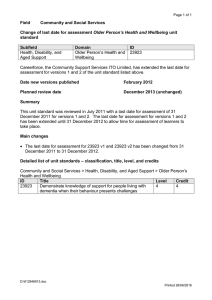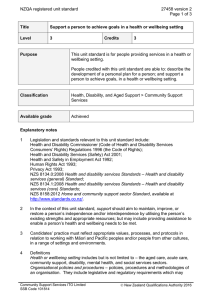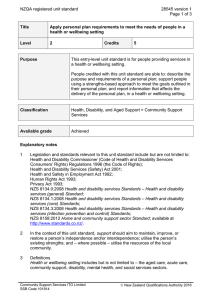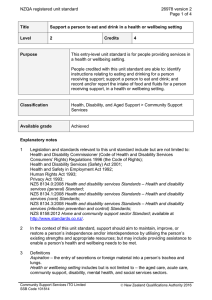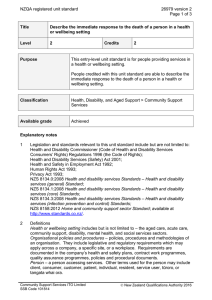Recognise and respond to changes to the health and disability context
advertisement
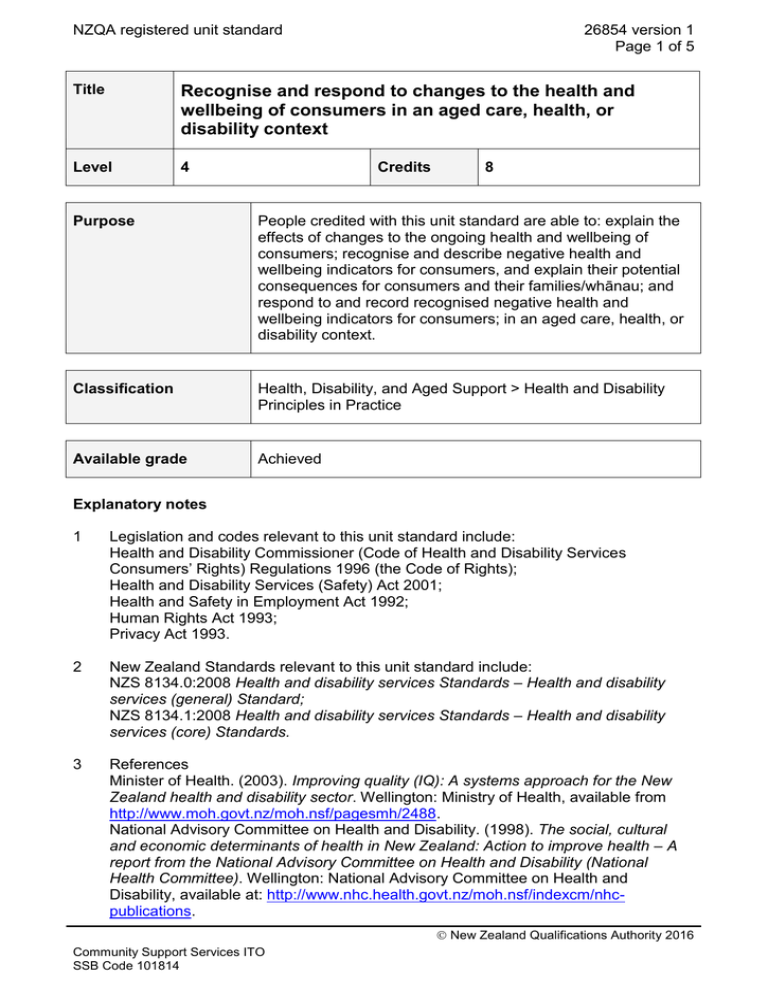
NZQA registered unit standard 26854 version 1 Page 1 of 5 Title Recognise and respond to changes to the health and wellbeing of consumers in an aged care, health, or disability context Level 4 Credits 8 Purpose People credited with this unit standard are able to: explain the effects of changes to the ongoing health and wellbeing of consumers; recognise and describe negative health and wellbeing indicators for consumers, and explain their potential consequences for consumers and their families/whānau; and respond to and record recognised negative health and wellbeing indicators for consumers; in an aged care, health, or disability context. Classification Health, Disability, and Aged Support > Health and Disability Principles in Practice Available grade Achieved Explanatory notes 1 Legislation and codes relevant to this unit standard include: Health and Disability Commissioner (Code of Health and Disability Services Consumers’ Rights) Regulations 1996 (the Code of Rights); Health and Disability Services (Safety) Act 2001; Health and Safety in Employment Act 1992; Human Rights Act 1993; Privacy Act 1993. 2 New Zealand Standards relevant to this unit standard include: NZS 8134.0:2008 Health and disability services Standards – Health and disability services (general) Standard; NZS 8134.1:2008 Health and disability services Standards – Health and disability services (core) Standards. 3 References Minister of Health. (2003). Improving quality (IQ): A systems approach for the New Zealand health and disability sector. Wellington: Ministry of Health, available from http://www.moh.govt.nz/moh.nsf/pagesmh/2488. National Advisory Committee on Health and Disability. (1998). The social, cultural and economic determinants of health in New Zealand: Action to improve health – A report from the National Advisory Committee on Health and Disability (National Health Committee). Wellington: National Advisory Committee on Health and Disability, available at: http://www.nhc.health.govt.nz/moh.nsf/indexcm/nhcpublications. New Zealand Qualifications Authority 2016 Community Support Services ITO SSB Code 101814 NZQA registered unit standard 26854 version 1 Page 2 of 5 4 Definitions Candidate refers to the person seeking credit for this unit standard. Changes in the context of this unit standard refers to any external factors (eg environmental changes, economic drivers, social/cultural determinants) or factors intrinsic to a consumer (eg metabolic changes, acute medical conditions, impaired/enhanced cognition), that cause – or may cause – a variation in the consumer’s level of physical and/or mental health and wellbeing. Consumer is defined in the Code of Rights and the Health and Disability Commissioner Act 1994 in the following ways: ‘Consumer means a health consumer or a disability services consumer; and, for the purposes of Rights 5, 6, 7(1), 7(7) to 7(10), and 10, includes a person entitled to give consent on behalf of that consumer.’ – Code of Rights, Regulation 4. 'Disability services consumer means any person with a disability that – (a) Reduces that person's ability to function independently; and (b) Means that the person is likely to need support for an indefinite period' – Health and Disability Commissioner Act 1994, s. 2. 'Health consumer includes any person on or in respect of whom any health care procedure is carried out' – Health and Disability Commissioner Act 1994, s. 2. Consumers may also be known as patients, clients, or tūroro, in particular contexts and settings. Health and wellbeing refers to a holistic concept of a person’s mental, emotional, physical, spiritual, and social wellbeing. Organisation’s policies and procedures are the policies and procedures of the employing organisation of the candidate and include ethical codes, standards, and other organisational requirements. Quality in the context of this unit standard is the degree of excellence to which a health-related organisation aspires in achieving its own service delivery objectives and meeting the needs of consumers and other stakeholders. The Ministry of Health identifies the five key dimensions of quality in the health and disability system as: people-centred, access and equity, safety, effectiveness, efficiency. [Ref: Improving quality (IQ): A systems approach]. Service plan is a generic term that covers individual or group plans (which may also be referred to by other names such as care plans) that are developed by service providers for people receiving support (and may include their family/whānau as appropriate). 5 This unit standard cannot be assessed against in a simulated environment. For assessment, candidates must demonstrate competence in the workplace through paid or unpaid employment, or in placements in a service provider workplace negotiated by an education provider. Outcomes and evidence requirements Outcome 1 Explain the effects of changes to the ongoing health and wellbeing of consumers in an aged care, health, or disability context. Range changes must include their effects on consumers’ mental, emotional, physical, spiritual, and social wellbeing. New Zealand Qualifications Authority 2016 Community Support Services ITO SSB Code 101814 NZQA registered unit standard 26854 version 1 Page 3 of 5 Evidence requirements 1.1 The positive effects of changes are explained in terms of the ongoing health and wellbeing of consumers. 1.2 The negative effects of changes are explained in terms of the ongoing health and wellbeing of consumers. 1.3 The importance of recognising positive and negative effects of changes is explained in terms of the provision of quality services to consumers and their families/whānau. Outcome 2 Recognise and describe negative health and wellbeing indicators for consumers, and explain their potential consequences for consumers and their families/whānau in an aged care, health, or disability context. Evidence requirements 2.1 Negative health and wellbeing indicators for consumers are recognised and described in accordance with their service plans. Range 2.2 negative health and wellbeing indicators may include but are not limited to variations in – eating, drinking, and sleeping patterns, pain levels, ability to function, daily routines, behaviour, communication, appearance, general manner or mood, participation and activity levels, achievement of goals; evidence is required of three indicators for each of two consumers. The potential consequences of negative health and wellbeing indicators for consumers and their families/whānau are explained. Range potential consequences may include but are not limited to – infection, malnutrition, reduced mobility, altered cognitive function, emotional distress, challenging behaviour, reduced independence, increased disability, social isolation, depression, neglect, change in relationships, death; evidence is required of two potential consequences for each of two consumers and their families/whānau. Outcome 3 Respond to and record recognised negative health and wellbeing indicators for consumers in an aged care, health, or disability context. New Zealand Qualifications Authority 2016 Community Support Services ITO SSB Code 101814 NZQA registered unit standard 26854 version 1 Page 4 of 5 Evidence requirements 3.1 Responses to recognised negative health and wellbeing indicators for consumers are in accordance with the nature of the indicators, consumers’ service plans, and the organisation’s policies and procedures. Range 3.2 responses to recognised negative health and wellbeing indicators may include but are not limited to – identifying a concerning trend, taking timely action, emergency response, changing the service plan, referral to appropriate services, managing closure; evidence is required of responses to two consumers. Recording recognised negative health and wellbeing indicators for consumers is in accordance with the candidate's role and delegated authority, and the organisation's policies and procedures. Range evidence is required of recording recognised negative health and wellbeing indicators for two consumers. Planned review date 31 December 2016 Status information and last date for assessment for superseded versions Process Version Date Last Date for Assessment Registration 1 17 June 2011 N/A Consent and Moderation Requirements (CMR) reference 0024 This CMR can be accessed at http://www.nzqa.govt.nz/framework/search/index.do. Please note Providers must be granted consent to assess against standards (accredited) by NZQA, before they can report credits from assessment against unit standards or deliver courses of study leading to that assessment. Industry Training Organisations must be granted consent to assess against standards by NZQA before they can register credits from assessment against unit standards. Providers and Industry Training Organisations, which have been granted consent and which are assessing against unit standards must engage with the moderation system that applies to those standards. Requirements for consent to assess and an outline of the moderation system that applies to this standard are outlined in the Consent and Moderation Requirements (CMRs). The CMR also includes useful information about special requirements for organisations wishing to develop education and training programmes, such as minimum qualifications for tutors and assessors, and special resource requirements. New Zealand Qualifications Authority 2016 Community Support Services ITO SSB Code 101814 NZQA registered unit standard 26854 version 1 Page 5 of 5 Comments on this unit standard Please contact the Community Support Services Industry Training Organisation Limited info@careerforce.org.nz if you wish to suggest changes to the content of this unit standard. New Zealand Qualifications Authority 2016 Community Support Services ITO SSB Code 101814
